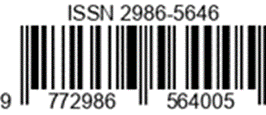Learning Cultural Arts (Music) in Class VIII 3 SMPN 2 Koto XI Tarusan
DOI:
https://doi.org/10.24036/ag.v2i2.122Keywords:
learning, cultural arts, traditional musicAbstract
The purpose of this research is to identify and explain how the implementation of Cultural Arts learning with the material of Indonesian Traditional Musical Instruments in class VIII 3 SMPN 2 Koto XI Tarusan takes place. This research is included in the type of qualitative research that uses a descriptive approach. Researchers use themselves as research instruments, as well as stationery and cameras as a means of data collection. Data were collected through observation, interview, and documentation. The data analysis process includes data classification, data clarification, data analysis, data description, and drawing conclusions from the data obtained. The results showed that the lesson planning was not in line with the lesson plan (RPP) that had been prepared previously. This is mainly due to the limited learning aids provided by the school, which are inadequate in supporting the learning process. In addition, teachers also face limited time constraints in implementing learning. In the learning process, the lecture method is widely used by teachers, and the use of learning aids is limited. Time constraints also affected the implementation of learning practices, so not all learning materials regarding talempong pacik music could be taught thoroughly. The results showed that learning has not fully provided satisfactory results. Although teachers try to give their best to learners and maintain their enthusiasm for learning, learners still seem to have difficulties in participating in learning, especially in the practice of traditional music.
References
S.A.M. Sardiman. (2011). Interaksi dan Motivasi Belajar Mengajar. Jakarta: PT Rajagrafindo.
Abadi, M. A., & Hadi, H. (2021). Pembelajaran Gitar Berbasis Daring di SMA Negeri 5 Tanjung Jabung Timur. Jurnal Sendratasik, 10(3), 117-128.
Ali, Matius. (2006). Estetika: Pengantar Filsafat Seni. Karang Mulya. Tangerang: Sanggar. Luxor.
Bafadal, Ibrahim. (2005). Pengelolaan Perpustakaan Sekolah. Jakarta: PT Bumi. Aksara.
Bastomi, S. (1988). Apresisasi Kesenian Tradisional. Semarang: IKIP Semarang. Press.
Jamalus. (1988). Panduan Pengajaran Buku Pengajaran Musik Melalui. Pengalaman Musik. Jakarta: Proyek Pengembangan Lembaga Pendidikan.
Lestari, Y., Syeilendra, S., & Hadi, H. (2018). Pelaksanaan Pembelajaran Bernyanyi Secara Unisono dalam Mata Pelajaran Seni Budaya di Kelas VII-3 SMP Negeri 2 Kecamatan Guguak Kabupaten Limapuluh Kota. Jurnal Sendratasik, 7(4), 19-26.
Marzam, M., WS, H., Indrayuda, I., & Maestro, A. (2023). Continuity and Changes in Gandang Sarunai's Music Performance in Alam Surambi Sungai Pagu Society's Socio-Cultural Activities, South Solok Regency, West Sumatra. Humanus: Jurnal Ilmiah Ilmu-Ilmu Humaniora, 130-139.
Marzam, M., Ambiyar, A., & Aziz, I. (2021). Effectiveness of Learning Assessment Through Feedback with Test Essays. Komposisi: Jurnal Pendidikan Bahasa, Sastra, dan Seni, 82-92.
Moleong, Lexy J. (2007). Metodologi Penelitian Kualitatif. Edisi Revisi. Bandung: PT Remaja Rosdakarya.
Moleong, Lexy J. (2012). Metodologi Penelitian Kualitatif. Bandung: PT Remaja. Rosdakarya.
Rooijakkers. (1991). Mengajar dengan Sukses. Jakarta: PT. Grasindo.
Rupiyanto, V. (2015). Bentuk Lagu Sirih Penyihir Karya Rino Dezapaty di Kota Pekanbaru Provinsi Riau. Skripsi. Pekanbaru Studi Pendidikan Sendratasik FKIP UIR.
Sedyawati, Edi (1992). Budaya Indonesia: Kajian Arkeologi, Seni dan Sejarah. Jakarta: Rajawali Pers.
Sopati, V. A., Hadi, H., & Wimbrayardi, W. (2018). Pembelajaran Bernyanyi Secara Unisono di kelas VII. 1 UPT SMPN 1 koto XI tarusan. Jurnal Sendratasik, 7(2), 58-62.
Sudjana, Nana. (2009). Penilaian Hasil Proses Belajar Mengajar. Bandung: PT. Remaja Rosdakarya.
Syeilendra, S. (2020). Belajar Pianika Pada Pembelajaran Seni Musik di Kelas VIII SMP Negeri 12 Kabupaten Solok Selatan. Jurnal Sendratasik, 9(4), 223-236.
Downloads
Published
Issue
Section
License
Copyright (c) 2023 Ramadandi Azidan, Marzam

This work is licensed under a Creative Commons Attribution-NonCommercial-ShareAlike 4.0 International License.











